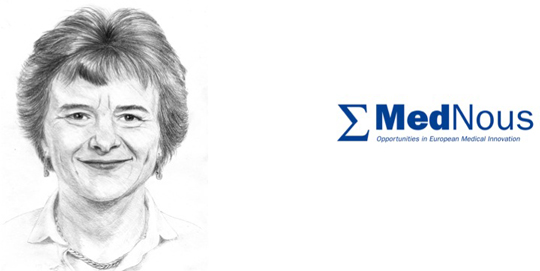Tag: European Commission
akampion Meets…. Victoria English, Co-Founder and Editor of MedNous
In 2006, long-time journalists Victoria English and William Ellington decided to quit their jobs and to establish their own publication, the biomedical trade journal MedNous (pronounced Med-Nows). A year later, in September 2007, the first issue appeared alongside with the website www.mednous.com.
akampion: Why did you establish MedNous?
Victoria English: Both of us thought Europe’s very innovative life science industry needed better communication. Back then, everyone was thinking in clusters and areas, and we felt by connecting the dots we could support the industry in its efforts to increase efficiency. Second, at that time the European Commission and the EMEA were very worried about the decreasing productivity of the biopharmaceutical industry, and Europe developed the Innovative Medicines Initiative, similar to the FDA’s Critical Path policy. This, too, called for better collaboration, and we wanted to capture this shift in official politics to encourage collaboration and translation of discoveries into products. Third, after working for many years in big corporations such as Reuters, DowJones, McGraw Hill and Informa, I thought it is time to start my own company.
akampion: What kind of preparations were necessary?
V. E.: After quitting our jobs we spent about 12 months to set up a website and a database, before we the first issue went out. During that time, we looked at every single bio-cluster in Europe and its member companies. Our database entries are updated ever since on a regular basis.
akampion: What exactly is MedNous focusing on?
V. E.: Originally, we focused on genetic therapy and stem cell therapy as we thought these were the most innovative areas and because no one else was writing about it. But it soon became obvious that these technologies were not that advanced as we thought, so we added other areas as well. Now we report about all companies developing products that will be regulated under the centralized procedure of the EMEA, plus projects validated by either venture capital funding or pharma collaborations. In fact, some companies emerge on our radar screen only after a huge financing.
akampion: How do you work?
V. E.: We do interviews on the phone, but for bigger stories we travel to the companies to get a first-hand impression. We also visit conferences. We are very interested in data, of course, but our key interest is answering questions like “what is the management like?”, “what is their strategy?”, “what have been their failures and successes?”
akampion: What does it take to fund a publication?
V. E.: You need to have capital, an interest in marketing and the business side. Luckily, we were able to finance the start ourselves, and now the company is generating revenues from subscriptions. And of course you need to adapt your technology all the time to spread the word. As an example, RSS feeds increasingly lost their importance – now it is all about Twitter and other social networks.
akampion: You still stick to a publication printed on paper. Why is that?
V. E.: Simply because we want to have an impact by providing a product that allows for a comprehensive view, which we think is valuable to the industry. For this reason we have also chosen not to break it down to single articles that can be purchased. We do, however, provide a PDF version of each issue.
akampion: You established an editorial board for MedNous. Why?
V. E.: We want to add some depth to our editorial coverage. So we take advice from the board on topics to write about, and we also ask members of the board to review our interviews before publication. Neither William nor I are scientists. We keep to the time-honored journalistic practice of maintaining independence from our sources, e. g, the people we interview do not vet articles about themselves. Yet we recognize that we need advice on some of the technical aspects. Members of the editorial board provide this advice. They are active and very valuable contributors.
akampion: How many people are working at MedNous?
V. E.: Currently we employ six people, including a contributing editor, web and production editors, proofreaders, etc.
akampion: What is your take on the European sector right now?
V. E.: In my view, Europe has a big competitive advantage over the US: the European healthcare systems may be diverse, but all are built on some kind of reimbursement and this guarantees a much closer look at the patient benefits of new medicines. So in this respect, feedback is much better and this will lead to products better serving the need of patients.
akampion: Do you still have time to do other things?
V.E.: Running a publication is a job that needs your attention most of your days, including the weekends. But I do enjoy visiting the British Library to read and I take modern dance and tap dance classes. In addition, I also help manage a number of community organizations including our local community center where I am a trustee.

